- Home
- Community
- Community Partnerships
- Faculty Spotlights
Community Engaged Faculty Spotlights
The Office of Community Partnerships (OCP) is committed to elevating university-community projects. You can see the published archive of community engaged faculty spotlights collected in the 2018–2019 academic year, 2019-2020 academic year and the 2020-2021 academic year.Read our 2021-2022 spotlights on faculty led community partnership projects below.
MAY 2022 SPOTLIGHT
Promoting STEM Education and Research through and for Community Engagement
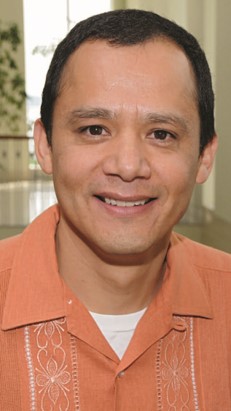
Adán Colón-Carmona is a professor of biology in the College of Science and Mathematics at UMass Boston. During his 21 years at UMass Boston, Colón-Carmona has aspired to balance and integrate his faculty responsibilities in scholarship, teaching, and service. More importantly, he is motivated in these areas by his dedication for social justice within higher education, as it has the potential to improve the lives of under-served populations in the U.S. Colón-Carmona’s professional work emphasizes his strong belief that academics (faculty, students, and staff) can be facilitators of social change with research, the education of others, and in promoting people’s personal growth as active members of society. As faculty at UMass Boston, Colón-Carmona is motivated by the University’s mission to being “a public university with a dynamic culture of teaching and learning, and a special commitment to urban and global engagement”. Consequently, he puts a particular emphasis on providing professional expertise to the University and communities off campus on issues that focus on disparities in health and science education, specifically on the education of under-represented groups in the sciences. Over the years, his scholarly projects focus on promoting equity and diversity in science, technology, engineering, and mathematics (STEM) education, at both undergraduate and graduate level, with an emphasis on making these fields more inclusive.
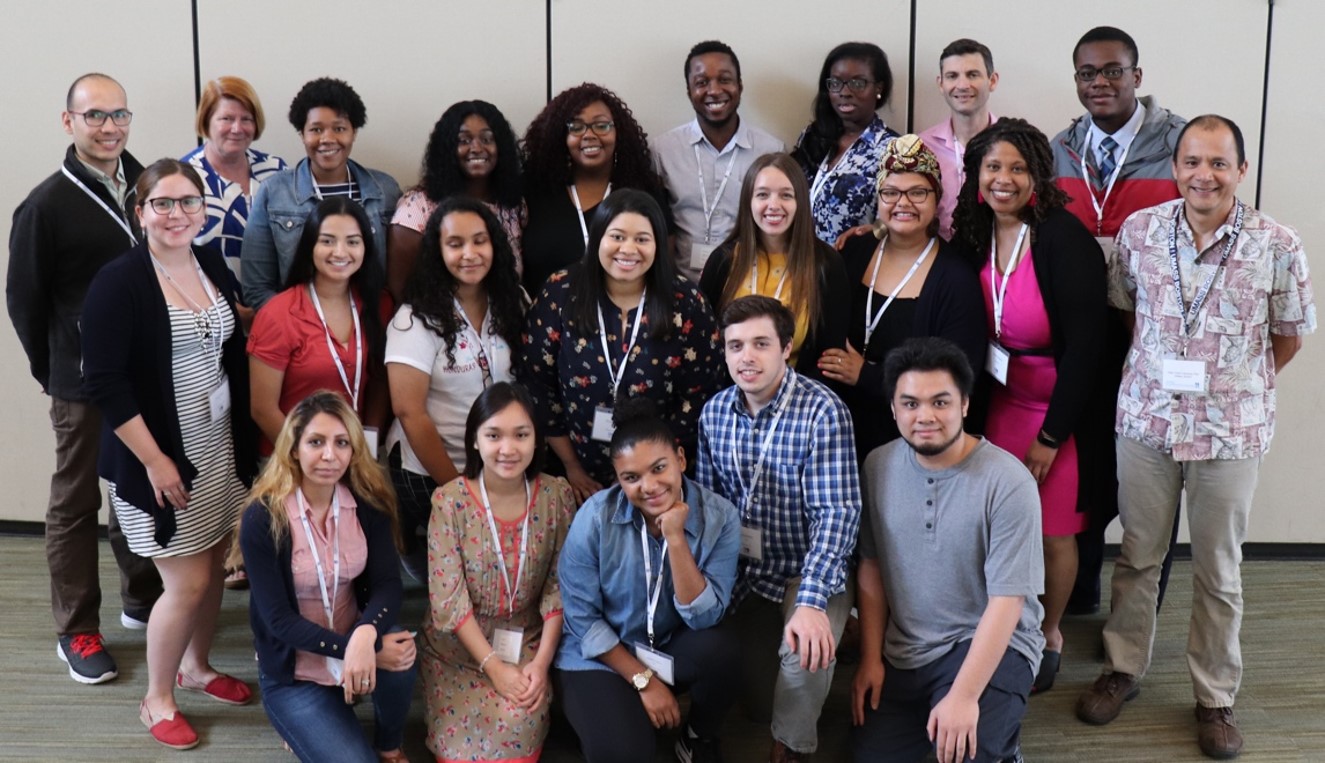
Since 2005, Colón-Carmona has helped to lead UMass Boston’s partnership with the Dana Farber/Harvard Cancer Center (DF/HCC) to address cancer and cancer disparities for under-served communities of color. Via collaborative efforts and support from the National Cancer Institute, the center has supported research, education of STEM trainees, outreach work with Boston area community organizations, and research capacity building on campus. Over the years, 36 research projects have been supported with 20 of them in the population sciences linked closely to community health, promoted the careers of over 300 students and early-stage investigators, and worked closely with several community-based organizations to improve the health of Communities of Color. More recently, Colón-Carmona has become part of a new collaborative project that focuses efforts on the health of Latinx communities in Massachusetts and is between faculty, staff, and community partners from throughout the Boston metro area. This Latinx Health Collaborative has created the Latinx Knowledge Hub which will assist in the development of equitable solutions to major equity and health challenges by creating platforms to manage data, analysis, and evidence in order to monitor, measure, and explain equity gaps.
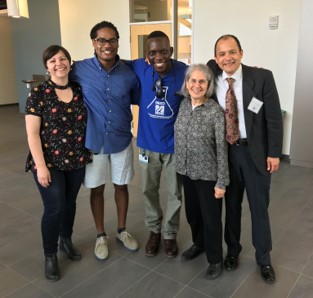
At UMass Boston, diverse students are central to the campus community. Colón-Carmona is constantly motivated and inspired by them, their life histories, and the global communities that they come from. Consequently, his scholarship is intertwined with making a difference in their lives and has worked to create communities of diverse student scholars on campus by co-leading or advising programs on campus that promote the community building and career advancement of individuals from marginalized and disadvantaged groups. Colón-Carmona is involved in campus training programs such as the Initiative for Maximizing Student Development (IMSD), Ronald E. McNair Program, Bridges to the Baccalaureate Program, Research Experience for Undergraduates, Summer Program to Advance Research Careers, and others have transformed lives and diversified the STEM fields. Programs such as these retain students in STEM majors, encourage them pursue graduate degrees and facilitate their professional development. Mentoring and teaching our diverse students, therefore, are part of the pleasures of Colón-Carmona’s community work at UMass Boston.
APRIL 2022 SPOTLIGHT
Structuring Community Dialogues for Democratic Engagement, Empowerment, and Life-Long Learning
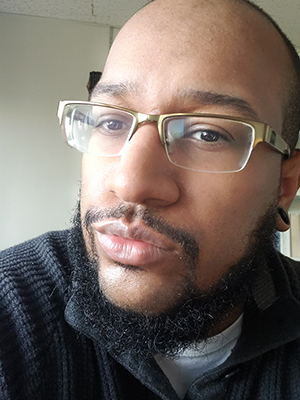
Dana Francisco Miranda is an assistant professor of philosophy and faculty fellow for the Applied Ethics Center at UMass Boston. For the past six years, Miranda has worked with institutions both locally and regionally to provide structured-dialogues around subjects of public interest to communities. As one of the developing partners of the “Encounters Series”, Miranda has served as a co-designer, public humanities coordinator, facilitator, and moderator for many of the dialogues that have been featured in New England. These dialogues have a two-tiered structure which utilizes small-group discussions and open forums as a way to have both informed and informal conversations around issues that often seem polarizing and unproductive.
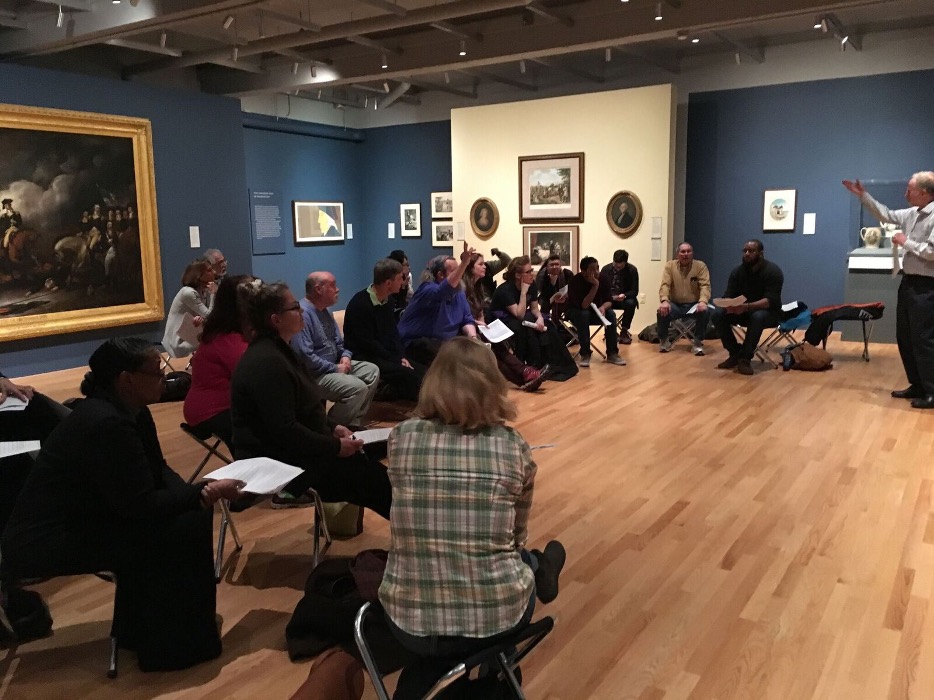
Through in-person and virtual gatherings, community members find themselves able to discuss, challenge, question, and even reaffirm their beliefs and positions. Through dialogue, participants are able to actively listen and publicly reflect, practice intellectual humility, gain access to research and scholarly expertise that is often inaccessible, discover experiences and views divergent from their own, and build their capacity to ask questions both as a form of democratic engagement and lifelong learning. Miranda posits, “Dialogues are powerful because they gather us into communities while also strengthening our own voices.” As Samara Johnson, a student and facilitator for the Encounters Series, has noted: “Dialogue is essential and empowering. I think of dialoguing as a skill we as a society crucially need to learn more about and actively practice in. I believe through these crucial conversations we truly learn more about ourselves and each other, and subsequently evolve and grow. Dialoguing plants a seed and is as a motivator to change.”
As an ongoing experiment, the Encounters Series first began as a collaborative conversation between institutional partners (which includes the Hartford History Center at the Hartford Public Library, the Wadsworth Atheneum Museum of Art, the Old Connecticut State House, The Democracy and Dialogues Initiative at Dodd Impact - University of Connecticut, the Akomawt Educational Initiative, and The Amistad Center for Art & Culture) about the needs of our representative communities and of our own capabilities. These conversations have never ended. For the Encounters Series, it is a “collaboration first” model that is dedicated to not only producing dialogues but to mirroring dialogic collaboration in all its processes.
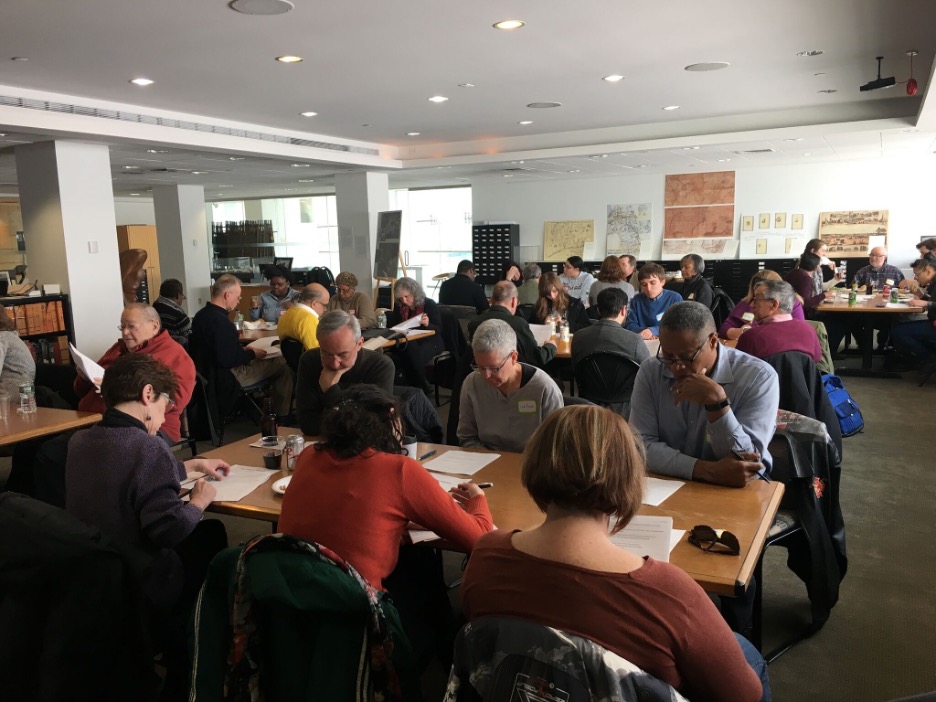
It is this exacting commitment to dialogue that Miranda seeks to exemplify in his teaching at UMass Boston. As a philosopher, Miranda deploys dialogic conversations in the classroom so that students may encounter their own assumptions and blindspots around controversial issues. “Dialogue allows students to become active participants and collaborators in their own learning. By formulating their own questions and by responding to questions put forth to them students begin to see themselves as well as the diversity of values, principles, and beliefs held throughout the world. Dialogues are then always encounters,” said Miranda. However, for many people, dialogues are often nerve-wracking endeavors filled with tension and fraught consequences.
Yet, the Encounters Series has successfully allowed hundreds of people to gather together and communicate with one another. Miranda shares, “That is the beauty of dialogue when it is done intentionally. For whether friends or strangers, whether there is agreement or disagreement, dialogues open up a space where silence once resided.” One can dialogue about surrealism, climate change, urban development, citizenship, or racism. But the topics themselves are endless. For dialogues are not merely interesting exchanges, rather they are necessary sites where our relationality is on direct display. The Encounters model is impactful precisely because it knows that the power of dialogue resides in it being serial and ongoing. We must continuously encounter one another, again and again. In other words, “Rinse and Repeat.”
MARCH 2022 SPOTLIGHT
Teaching English Education Classes for Individuals Impacted by the Justice System
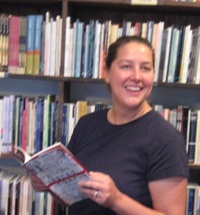
Jill McDonough is a professor of english within the College of Liberal Arts and the Undergraduate Program Director of the Creative Writing Program. When McDonough came to UMass Boston as a visiting writer in 2008, she was still working at Boston University's Prison Education Program. The classes did not pay much, but she spent thirteen years working in men's and women's prisons in Massachusetts, and loved the work that she did.
To celebrate her tenure in 2017, McDonough began volunteering in a jail. It took a lot of meetings to get that first class started; she remembers being frustrated during a summer lunch meeting at UMass Boston, when everyone wanted classes in the jail, but funding was difficult to come by. McDonough asked, “What if I just do it?”
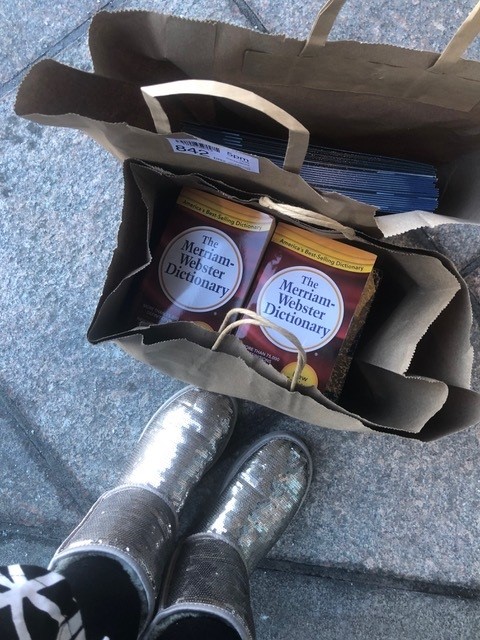
So she did. McDonough developed a lesson plan template that could engage experienced students and welcome new ones. She came in every week, not just when UMass Boston was in session positing, “there's no spring break in jail”. In 2017-2018 she taught a weekly course in the South Bay House of Correction. The consistency, cheer, and flexibility led to institutional trust and partnership.
During the 2018-2019 academic year, McDonough brought a grad student with her. She trained, co-taught with, and observed, then provided support as she did it on her own. Once the jail education administrators saw the consistency and effort being put in, they invited McDonough into a second facility, the Nashua Street Jail. Since then McDonough has continued to work with students and alumni over the summers, and two graduate students during the school year. This allows the provision of multiple continuous classes in two jails: College Reading and Writing, a book club based on Reginald Dwayne Bett's Felon, and a memoir class, requested by a group of writers at Nashua Street Jail.
Providing classes every week allows incarcerated students to try it for the first time or stick with it as long as they like, no matter when their sentences start or end. To date, McDonough has trained and observed six Master’s of Fine Arts students and alumni for this work, brought in internal and external funding for books and summer salaries, and continued the work with only a couple COVID-19 related breaks since the program’s initiation. The program is now Zooming into two jails at once, and has served 252 incarcerated students as of February 2022.
McDonough shares that she has used funding through the Babette Schiller-Spiegel Memorial Fund for Prison Education to buy cases of dictionaries from Merriam-Webster, as well as folders and notebooks and textbooks with a discount from Brookline Booksmith. Reflecting on the role of philanthropy in advancing prison education programs, she encourages people to support programs like the Babette Schiller-Spiegal Memorial Fund saying, “A little donation can do a lot of good in jail.”
Looking forward, McDonough hopes to find a way to give college credit to the students who earn it stating, “it's hard to complete a full semester's worth of work and a longer research paper even when not incarcerated, but a few students have done it from inside the jails.” She would love to offer college credit for them and make it available to more determined students in the future.
FEBRUARY 2022 SPOTLIGHTS
Making Inclusion Real: Promoting Inclusion with Persons with Disabilities Around the World
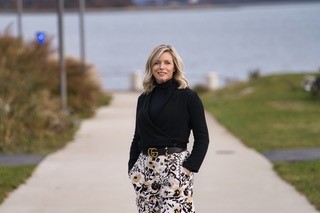
Valerie Karr is a professor of international development within the school for Global Inclusion and Social Development. She has been working on the inclusion of persons with disabilities and vulnerable groups since she was an undergraduate student working with families whose children had recently been diagnosed with autism. Karr was inspired to go into inclusion work at a young age after forming a friendship with her best friend’s brother who had Cerebral Palsy. Ever since she has strived to support inclusion with the belief that persons with disabilities have the same human rights and fundamental freedoms as every other member of society.
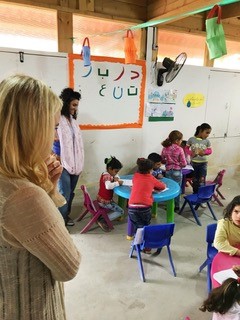
Her experiences led her to a PhD program at Columbia University where she had the opportunity to participate in the negotiation of the United Nations Convention on the Rights of Persons with Disabilities. This work brought together advocates with disabilities, world leaders, human rights advocates, and herself, an academic and an educator. Karr has worked in this field for a total of 21 years and the progress and growth in inclusive development work (the inclusion of vulnerable groups in society) has grown each year. It went from advocating for a place at the table, to raising awareness on what rights mean for persons with disabilities, to being asked to help in making inclusion real. Karr works around the world helping organizations and systems develop inclusive approaches. One aspect that is vital in her community engaged work is a close relationship with organizations of persons with disabilities and a team of local researchers as partners. Working internationally, partnership is key in understanding cultural contexts crucial for this work. Karr designs the approach to inclusion (from technical guidance to implementation and monitoring) and develops a “toolbox” for inclusion. She works diligently to make her work actionable and understandable, while seeking to be a resource to her partners and communities to make their journey to inclusion easier. Karr has worked at senior levels with both the United Nations and the development arm of the United States (USAID) and seek to change lives at local levels as well as at a systems-level so that future programs are inclusive.
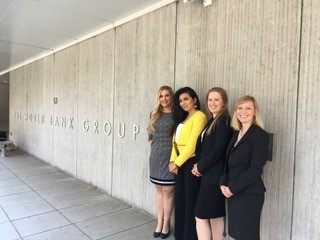
Karr also includes her community-engaged work within her classes. Many of her students are interested in the work that she does, and Karr notes that the field needs them. While working on issues related to global inclusion, it’s typically a small voice in a big pond. However, the momentum is growing, and it’s important that students are ready to join this work. In the field of inclusion, there isn’t a solid foundation and evidence-based, which is why it is vital for Karr’s research and scholarship to contribute to both development and academic sectors. Karr encourages anyone interested the field to come along. There’s so much work to be done and so much interest within the field. Karr is optimistic about the enthusiasm and efforts that are going into disability inclusive development, and she needs all hands on deck.
Together, Avancemos!: Building Community Partnerships to Advance the Science of Maternal and Child Health in Latinx Populations
Ana Cristina Lindsay (Terra de Souza) is currently Interim Associate Dean for Research and Associate Professor in the Manning College of Nursing and Health Sciences. Lindsay is a community-based public health researcher trained in pediatric dentistry and maternal and child health. A major tenant of her work is to address issues of justice, equity, and inclusion. The ultimate goal of her research is to advance the science related to reducing disparities in maternal and child health in Latinx populations in the United States and Latin America.
Lindsay started her research in her home country, Brazil, working with the Programa de Agentes Comunitários de Saúde (PACS) (The Community Health Workers Program) in the State of Ceará. Community health workers are local community members who undergo brief training in preventative and simple curative health care. In one of her first works, Lindsay teamed up with community health workers to investigate the circumstances of post-neonatal death. Lindsay recalls this transformative experience, “It was clear that the community health workers had a better understanding of the underlying factors leading to the death of these infants. They learned from my questions, but I also learned from theirs. It was this interaction and dialogue that was empowering for all of us.” She adds that working with PACS was instrumental in the way she engages in research to this day.
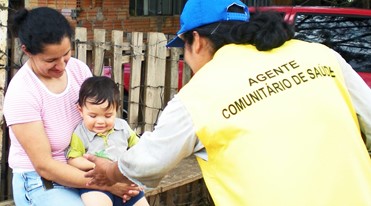
Inspired by the work of her fellow Brazilian, Paulo Freire, who considered education a force for empowerment and liberation, Lindsay’s work at UMass Boston involves engaging underrepresented minoritized students to explore, reflect, and identify solutions for health issues in the communities they come from. “One of my most fulfilling roles has been to serve as a faculty mentor in community engaged research.” Lindsay recognizes that “efforts to address health disparities require training the next generation of Latinx health professionals to become part of a culturally competent workforce.”
Lindsay starts every course at UMass Boston by telling students her story of becoming a public health researcher, pursuing higher education, and what motivates her to do research and teach. “Telling students my story inspires them to believe they can do more—for themselves and their communities.” Her goal is to create an innovative, collaborative, and active learning environment so that they can apply knowledge in real-life. “Teaching at UMass has allowed me to instill in my students a sense of individual and collective responsibility to health equity.”
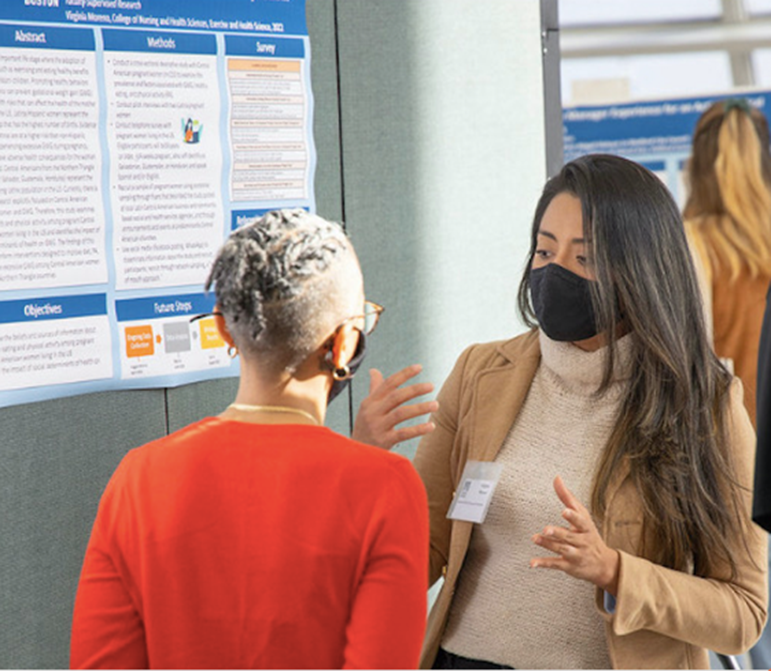
In 2017, she created Avancemos!: Advancing Research Skills and Professional Career Opportunities in Health Sciences for Latinx Undergraduate Students. The program is designed to increase student interest and connection to the university through community engaged research in the communities where they come from. Lindsay believes that “the success of Avancemos! comes from building partnerships between academia and under-resourced Latinx communities.” Currently one of the student researchers, Virginia Moreno, an immigrant mother from El Salvador, is conducting interviews with pregnant women from Guatemala, Honduras, and El Salvador to identify the social determinants that impact excessive gestational weight gain.
Just like the community health workers program in Brazil, this project exemplifies the importance of having community members involved in research, “The pregnant women in the project easily open up to Virginia about their experiences because they can identify with her as an immigrant, a mother, and as a native speaker.” Lindsay considers community engaged research ascritical to achieving health equity, stating, “Throughout my work, I have reaffirmed that it is only when communities are engaged together in inquiry that we can substantially impact the lives and health of individuals and their communities.”
DECEMBER 2021 SPOTLIGHT
Supporting Peace, Democracy, and Restorative Justice in Boston and Nigeria
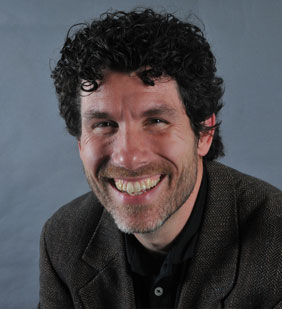
Darren Kew is a professor of Conflict Resolution and director of the Center for Peace Democracy and Development.He aims to support the efforts of community actors worldwide with strategies, evaluation, and new skills that can improve their peace and democracy impacts, while at the same time learning from these partners so that knowledge can be shared with other activists elsewhere. In Boston, that has meant such efforts as working with the Boston Busing and Desegregation Project to hold community dialogues on bridging racial divides in the city, or with the Islamic Center of Boston in Wayland to conduct dialogues between members of Muslim communities in the region and local law enforcement over its policies toward these communities. Kew has also assisted CPDD colleagues professor Jeff Pugh, Ph.D., student Allyson Bachta, and Madhawa Palihapitiya of the Massachusetts Office of Public Collaboration, who have set up an early warning/early response system to monitor the potentials for violence in the United States related to the 2020 elections and militant groups thereafter. He notes, “my colleagues in the Center, who include our students, are working on some of the most important issues for peace in the United States and globally at the grassroots level.”
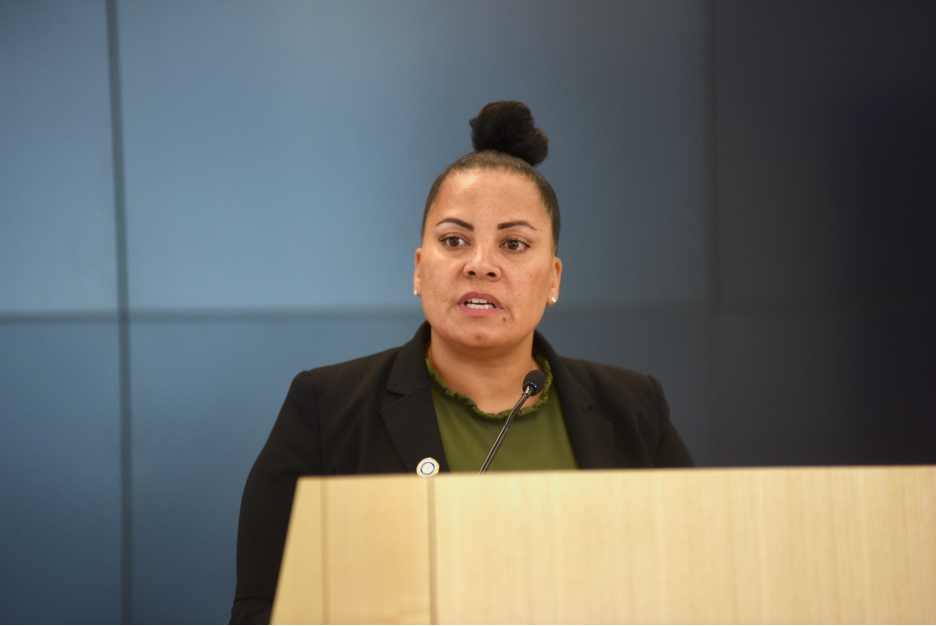
Kew has also joined and supported restorative justice initiatives at CPDD led by professors Karen Ross, David Matz, and Eben Weitzman, Senior Fellow Daria Lyman, and Ph.D. students Denise Muro and Krystal-Gayle O’Neill. Many of these initiatives are in Massachusetts prisons, supporting the efforts of incarcerated men to reflect on the roots and structural dimensions of their crimes, to heal, to take responsibility, and to move forward in a manner that helps themselves, their families, their communities, and where possible, their victims as well. CPDD also worked with the Suffolk County District Attorney’s Office to help it set up its own system of managing juvenile offenders to include restorative justice components. In recognition of this work, then DA and now US District Attorney Rachel Rollins gave the 2019 Slomoff Lecture of the Department of Conflict Resolution, Human Security, and Global Governance, where CPDD is housed. CPDD’s restorative justice team is also working on developing a restorative justice system for the UMass Boston campus.

Much of Kew’s work over the years has been devoted to working with communities in Nigeria on 1) bridging religious and ethnic divides, and 2) strengthening the democratic system to improve its responsiveness to local needs. His scholarly work, such as his 2016 book on the subject, argues that these two processes – conflict resolution and democracy building – are deeply connected, such that each helps to build the other when done properly. His work on assisting Nigerian partners to conduct Muslim-Christian dialogues has gained global press attention and was also the subject of a TED talk. He continues to learn from and work with these Nigerian peace networks to try to expand their impacts and support their efforts. Kew notes,“Nigeria is one of the most diverse societies in the world, with over 200 different ethnic groups who are divided 50-50 between Islam and Christianity. Our partners there have much to teach us on how best to bridge those divides, and in helping them we can do our part to maximize their impacts.”
Kew finds continuing inspiration in the work of his partners worldwide and his colleagues at UMass Boston. “It is a deep privilege to work with activists and scholars in Nigeria and elsewhere who are devoting their lives – and often risking them – to spreading peace, justice, and democracy across their communities and beyond. UMass Boston students, faculty, and staff are in a unique position to help activists here in Boston and worldwide to facilitate peace and justice efforts using our skills, scholarship, and boundless spirit. And there is so much that students, alumni, and friends in the community can do with as little or as much time and interest as they have: join local initiatives, take a class or short workshop, or join our efforts overseas – check us out and we will make it happen!”
OCTOBER 2021 SPOTLIGHT
Enhancing the Capacity of Community-Based Organizations to Improve their Communities through City Planning
Ken Reardon is a city planner who serves as a professor and chair of the newly established Department of Urban Planning and Community Development in UMass Boston’s School for the Environment. Reardon uses participatory action research methods to support resident-led neighborhood stabilization and revitalization efforts in severely distressed urban and rural communities. His empowerment approach to community planning research and practice integrates the core theories and methods of participatory action research, direct action organizing, and popular education to enhance the capacity of community-based organizations to influence the public and private investment decisions affecting their communities.
Before joining the UMass Boston faculty in 2015, Reardon was a tenured member of the urban planning faculties at the University of Illinois at Urbana-Champaign, Cornell University, and the University of Memphis where he played a key role in establishing long-term community-university partnerships aimed at addressing our nation’s increasingly uneven pattern of metropolitan development. In 2016, Temple University Press published, Rebuilding Community After Katrina: Transformative Education in the New Orleans Planning Initiative, a book co-edited by Reardon and John Forester, describing the work Reardon and his students did with leaders of the Association of Community Organizations for Reform Now (ACORN) to secure funds to redevelop New Orleans’ Lower 9th Ward following Hurricanes Katrina and Rita.
.jpeg)
In 2019, Social Policy Press published Reardon’s latest book, Building Bridges: Community and University Partnerships in East St. Louis, which describes a long-term partnership between the city’s faith-based communities, and more than a dozen University of Illinois at Urbana-Champaign departments aimed at addressing the structural causes of persistent and concentrated poverty in this historic African American community. Reardon co-founded and served as the faculty director for this highly acclaimed public scholarship program for ten years.
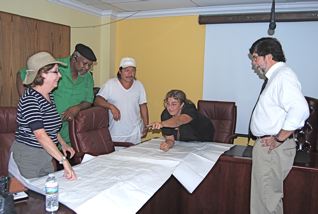
Over the past six years, Reardon has involved UMass Boston’s undergraduate community development and graduate urban planning students in a number of local, national, and international planning projects with community organizations and public agencies committed to expanding opportunities for individuals with the fewest economic resources and life choices. Shortly after his arrival, Reardon and his students partnered with Roxbury’s Highland Park Neighborhood Association to produce a neighborhood preservation strategy for this community, which is facing powerful development pressures. Following this effort, Reardon and his students collaborated with leaders of the Moore-Mickens Neighborhood Association in East Tampa, FL to explore adaptive re-use options for a historic African American school complex located in the heart of their community. More recently, Reardon’s classes worked with a coalition of UMass Boston student, staff, and faculty unions to examine the potential displacement effect of the Accordia Partners’ Dorchester Bay City Proposal for the former Bayside Exposition site owned by the UMass Building Authority, which is under review by the Boston Planning and Development Agency. Reardon has also collaborated with Antonio Raciti, an assistant professor of environmental planning and ecological design and several School for the Environment doctoral students to establish a website celebrating the life and work of renown “advocacy planner” Paul Davidoff who undertook a wide range of planning and legal efforts to dismantle exclusionary zoning ordinances which played a pivotal role in supporting racially segregated communities in the US. Reardon is currently working with students in his Community Economic Development Finance class to assist the leaders of the historic Campbell AME Church in the Anacostia neighborhood of Washington DC to promote more inclusive development policies and strategies for this important African American community.